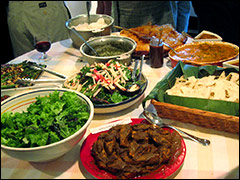Climate Culture
All Stories
-
Is your town?
What if cities had no sidewalks and everyone walked on the road? Or, for urban recreation, they walked on a few scenic trails? What if the occasional street had a three-foot-wide "walking lane" painted on the asphalt, between the moving cars and the parked ones?
Well, for starters, no one would walk much. A hardy few might brave the streets, but most would stop at "walk?! in traffic?!"
Fortunately, this car-head vision is fiction for most pedestrians, but it's not far from nonfiction for bicyclists. Regular bikers are those too brave or foolish to be dissuaded by the prospect of playing chicken with two-ton behemoths. Other, less-ardent cyclists stick to bike paths; they ride for exercise, not transportation. Bike lanes, in communities where they exist, are simply painted beside the horsepower lanes.
People react reasonably: "bike?! in traffic?!" And they don't. "It's not safe" is what the overwhelming majority say when asked why they bike so little. (As it turns out, it's safer than most assume -- on which, more another day.)
So what would cities look like if we provided the infrastructure for safe cycling? What does "bike friendly" actually look like?
-
Do gas prices affect behavior or not?
Despite record-setting gas prices, U.S. drivers haven't changed their gas-guzzling habits, says AP. Not only are we consuming as much as we always have, new vehicle sales seem to be tilting even more in favor of trucks than cars.
But wait, USA Today disagrees. They say that drivers are, in fact, starting to cut back on how much they drive -- a clear sign that higher gas prices are starting to bite.
Who's right? Who cares! Either way, the consumer response to massive increases in gas prices over the last five years has been teensy-tiny.
-
Sundance launches TV’s first eco-centered primetime block
Your TV just got a little smarter. As Amanda mentioned last month, the Sundance Channel has launched "The Green," a weekly primetime destination that showcases original series and documentaries based on the earth's ecology and "green" concepts for living in better harmony with the planet.
I'm personally excited about this project now that my favorite Seafood Contamination Campaign spokeswoman, Amber Valletta, has her very own spot. She joins the ranks of other thespians, athletes, and supermodels using their fame for the good of the environment.
Check out this actress in action:
-
From Grillz to Grime
You know the grill Purists that we are, we’re so thankful that a carbon-neutral dental practice has opened in the U.K. Now we can fly across the pond to glam up our grillz, guilt-free! Photo: Corey McKrillClick to enlarge Strike a poser The Material Girl justified her love for Live Earth with a new single […]
-
And I Am a Recycled-Material Girl
Madonna releases single to support Live Earth climate efforts What is it about climate change that makes music … suck? First we had Melissa Etheridge’s “I Need to Wake Up,” the earnest, Oscar-winning Inconvenient Truth anthem. Now we have Madonna’s “Hey You,” a somnolent single released this week in conjunction with Live Earth, the continents-spanning […]
-
The Beak In Review
West Nile virus hitting bird populations hard, says new study The West Nile virus soldiers on, declares a report published yesterday in Nature. Eight years after the virus left the West Nile and made its way to the U.S. Northeast, chickadee populations in the region have dropped 53 percent, while Eastern bluebird populations have been […]
-
Circle of Blue
Check out Circle of Blue, a new initiative to coordinate journalists and educators around the mission of injecting the freshwater crisis into mainstream dialogue. Modeshift has a long and informative introduction to the project.
-
Network TV’s best show is cancelled
It’s no secret that we have a Grist-wide crush on Kristen Bell (the world’s sexiest vegetarian!). So I feel obliged to take a break from the green and note with great sorrow that CW has cancelled Veronica Mars, Bell’s sharp, sassy, criminally underappreciated star vehicle. It’s a cliche at this point that females are bombarded […]
-
On slow food, communal eating, and Reubenesque sandwiches
This is the last in a series of articles about connecting with people over spring meals. Read others on setting up a dining co-op, celebrating Passover, hosting an Earth Dinner, and appreciating slow food. In my last column, I wrote about the slow-food movement, which unites people interested in flavors, food preservation, and, of course, […]
